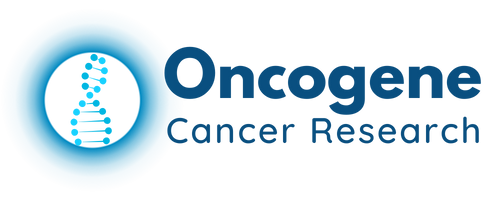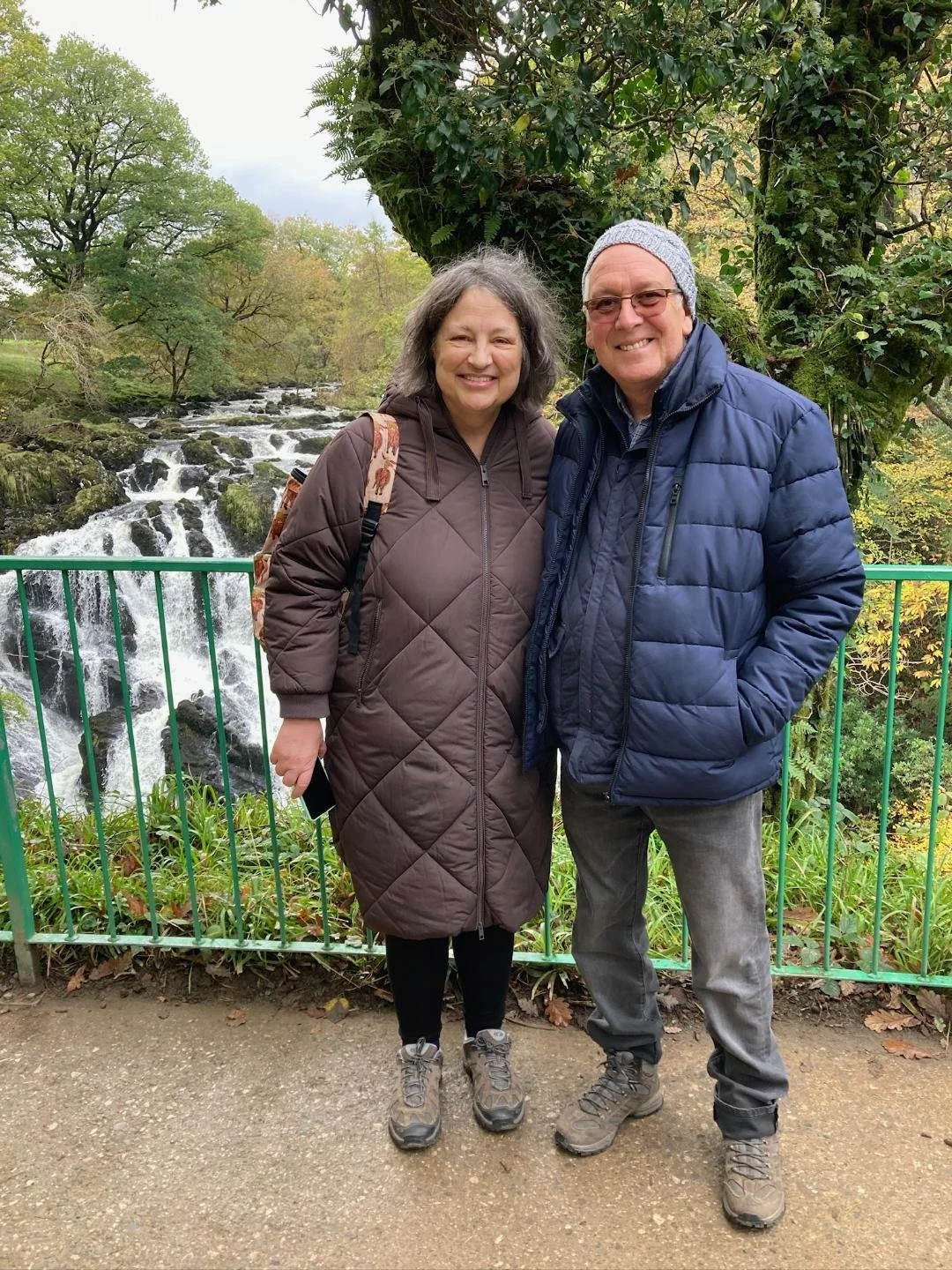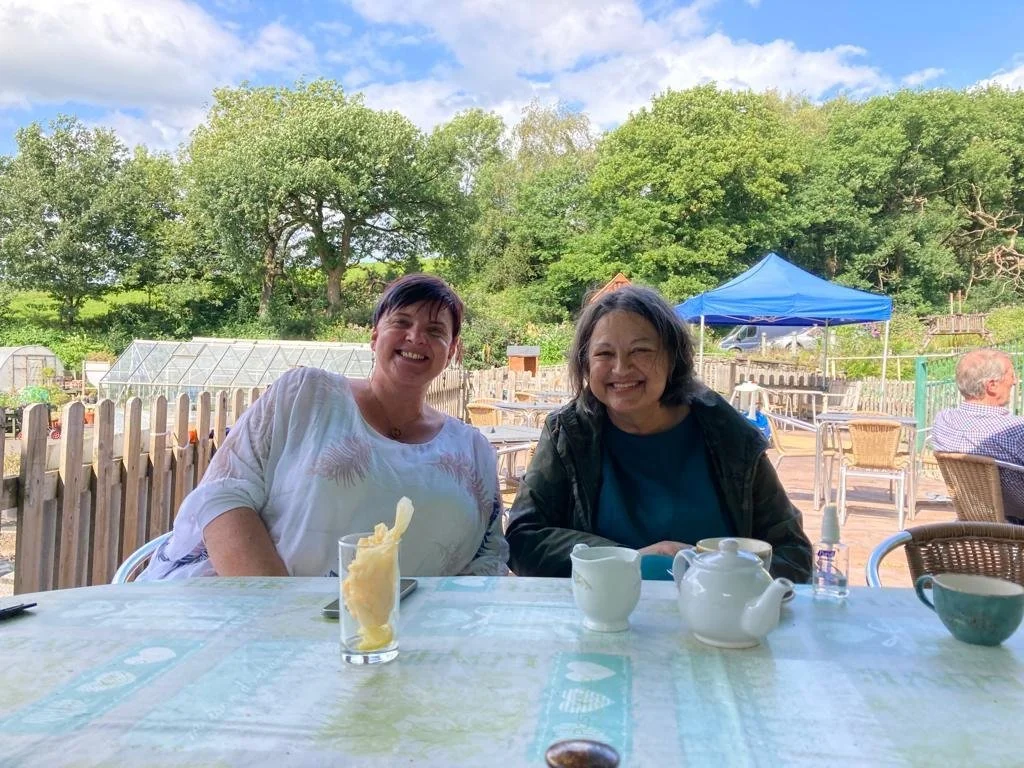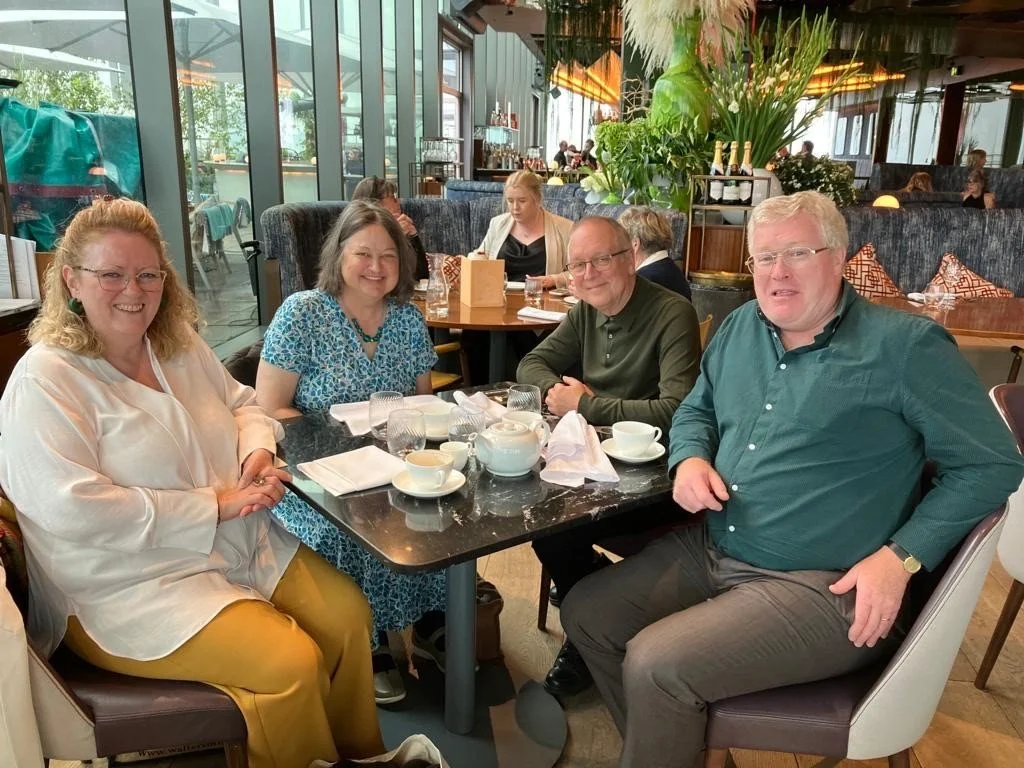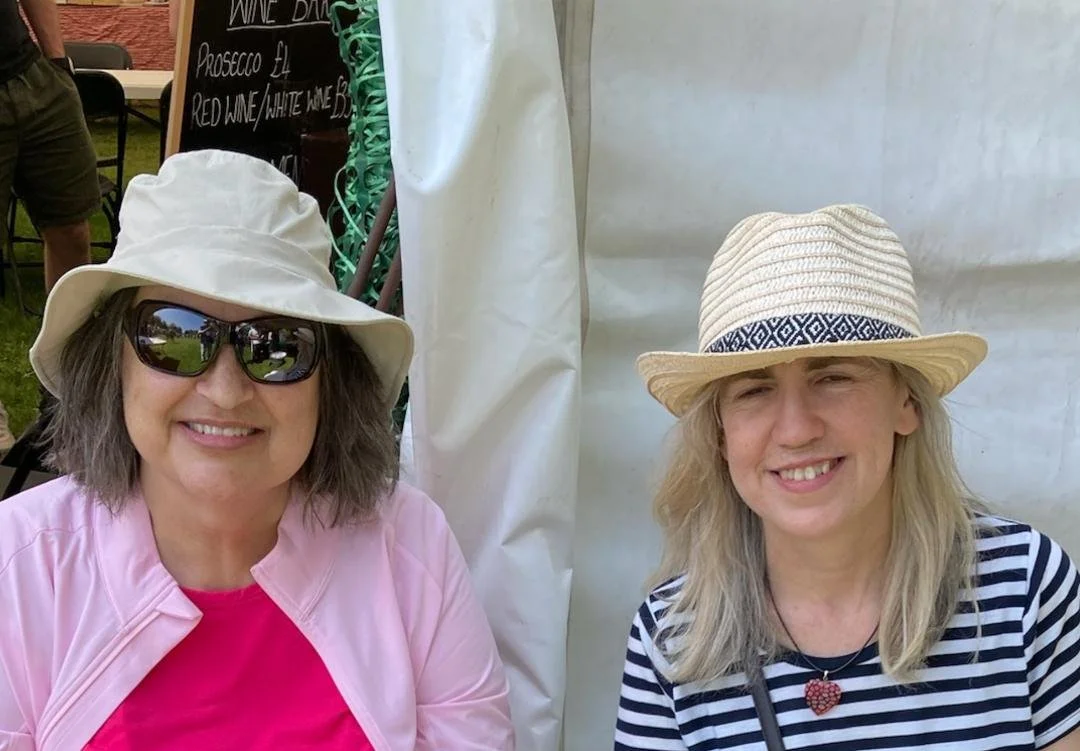Patient stories.
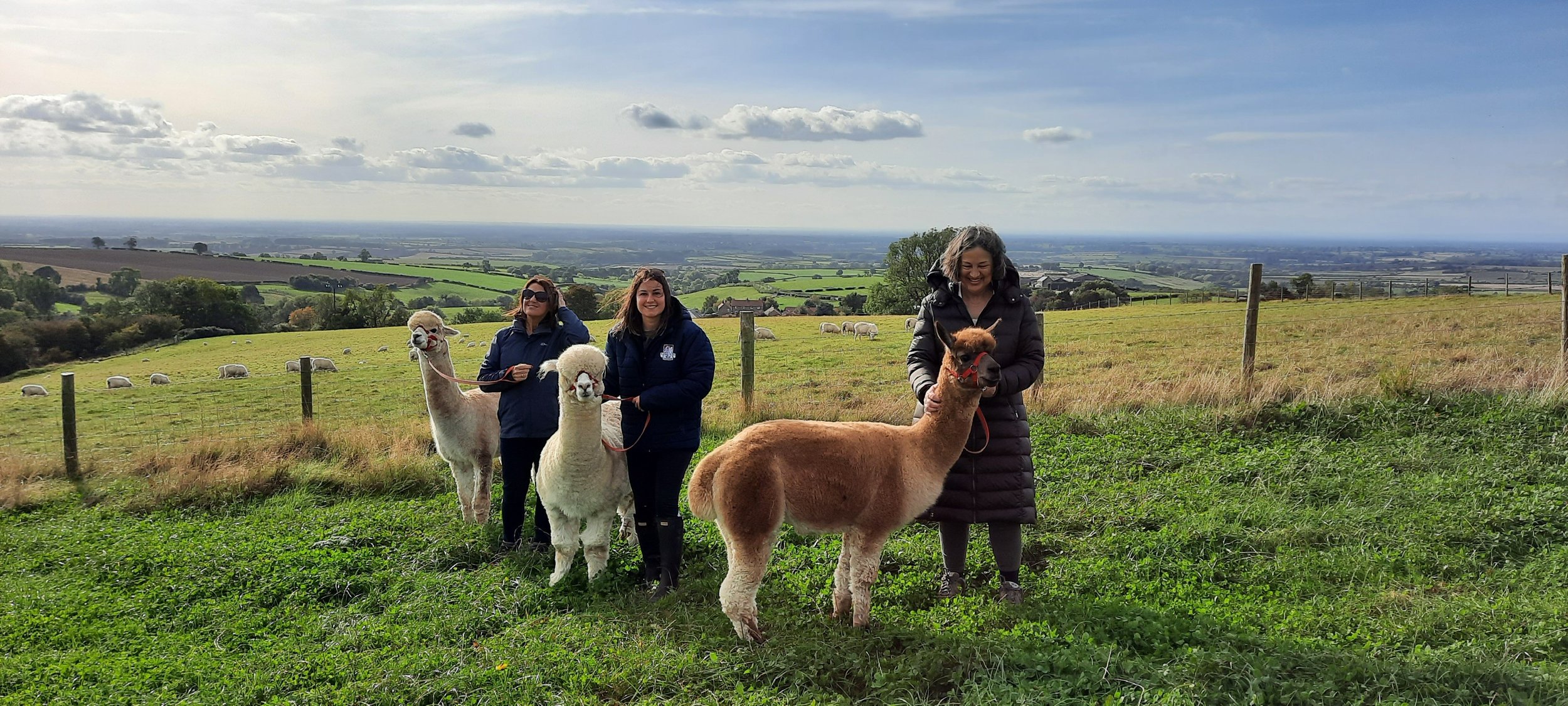
Thanks to research, I feel like I am living with a chronic condition.
— Sally Hayton (far right, petting alpacas with cousin Trisha and goddaughter Breesha) diagnosed with stage IV, ALK lung cancer in 2013
Sally’s story
I was diagnosed over 10 years ago, and at that time you started with chemo. Thankfully, not long after, the standard for ALK+ lung cancer changed to targeted therapies as first line treatment.
Sally (L), with partner Frank at Swallow Falls North Wales
Sally Hayton, an occupational therapist in social care from Manchester, in the UK, has always been healthy and led an active life. She worked in a meaningful job, led an active social life with her partner, enjoyed holidays in Scotland and supporting her dad.
Back in 2013, however, when Sally was just 49 years-old, she started noticing that she was losing sight in her right eye. Sally saw an optician and was immediately referred to an eye hospital. Dizzyingly, just three hours later, she received the unbelievable news that she had a tumour behind her right eye. A biopsy from the tumour showed that the primary tumour was from her lung. Sally was then referred to a consultant respiratory physician who confirmed the news that she had stage IV lung cancer that had metastasised to her eye.
Sally underwent biomarker testing, which she had never even heard of, and recalls waiting about three weeks for the results. Sally’s consultant explained that given she had never smoked, it was likely she may have a mutation like EGFR or ALK which would inform her treatment plan and likely have a better prognosis. Sally says, “The whole experience was surreal. I was totally shocked to find out I had incurable lung cancer. When I was told that my lung cancer was ALK-positive, I was very relieved that a treatable mutation had been found.”
Life-changing role of targeted therapies
Prior to the identification of treatable oncogenic drivers in lung cancer – like ALK, EGFR and RET – all advanced lung cancer patients had a similar poor prognosis and were treated mainly with chemotherapy and radiotherapy. The discovery of ALK-positive lung cancer in 2007 led to a race to create a new class of drugs. The first approved ALK-specific targeted therapy was crizotinib and it was introduced into the UK in December 2012 – about a year before Sally’s diagnosis.
Reflecting back, Sally says, “I was diagnosed over 10 years ago, and at that time the treatment recommended by the NICE guidelines within the NHS was to start with chemotherapy and then move to maintenance chemotherapy before moving on to crizotinib. Thankfully, not long after, the standard of care for ALK cancer changed to targeted therapies as first line treatment.”
Sally (L) with friend Colette
Sally adds, “I started with the first available targeted therapy for ALK, called crizotinib, and when that stopped working, I moved onto a next-generation inhibitor called brigatinib, which I continue to take. I have found that the treatments have become less toxic as I have moved from one to the next. Additionally, I have had radiotherapy to my right eye as well as to two brain tumours. It has been amazing to see how thanks to research the treatments have evolved over the last 10 years and are still evolving.”
Sally is thankful to be alive and feel like she is living with a chronic condition. But she adds, “My journey has had its ups and downs – it’s not easy to face progression or complications. My health varies from day-to-day. My pace of life is much slower now, and I have to rest during the day. I have to accept that I am now living with a chronic condition.”
Ensure your oncologist or care team have knowledge of ALK or your oncogene.
Build a connected healthcare team and network
For many patients, it’s not uncommon to leave appointments with unanswered questions. That’s why before her regular appointments, Sally writes a list of questions or concerns to raise. She feels fortunate to be cared for by an oncologist and team who listen to her and involve her in decisions about her care.
Sally advises anyone newly diagnosed to ensure their oncologist or care team have knowledge of ALK or their oncogene. She says, “If this is not possible, I would ensure that the team is willing to liaise with an ALK specialist to get the best care.” Sally also highlights the importance of advocating for yourself or having someone who can advocate on your behalf.
Sally and Frank with friends Heather and Charles
Sally wants to see pharma and others in industry fund more research into ALK and other oncogenic-driven lung cancers. She believes the medical community should get involved in research projects beyond clinical trials. And, she would like researchers to have a deeper understanding of oncogene-driven lung cancers to use this knowledge and skills to progress research. Sally says, “It is so important to raise awareness of ALK and other oncogenic-driven lung cancers so that people are diagnosed at earlier than stage four – when incurable. We also need treatments to be equally accessible across different parts of the UK.”
Having a strong support network also plays a key role for Sally and she is fortunate to count on the support of her partner, good friends and key family members. Health related support comes from her oncologist, lung cancer nurse, other members of staff at The Christie Hospital, along with her GP. A big amount of support comes from the worldwide ALK support group based in the US, as well as one here in the UK. She says, “I feel very fortunate that this support has continued throughout my journey.”
Sally (R), with friend Helen in North Manchester
More research is vital
Sally is a big believer in research. She has volunteered her time as a patient representative for a number of organisations including the Roy Castle Lung Cancer Foundation, the NCRI, different ALK cancer charities and Greater Manchester Cancer, helping to represent the patient voice and needs in new treatments or proposals that impact patients. She’s also informally supported patients encouraging them to ask their clinical teams questions.
Sally has high hopes and says she’d like research to:
Help diagnose more people at stages earlier than stage 4 and truly find curative treatments for these people
Find new treatments for people who do not respond well to those currently available
Create less toxic treatments
Better treat brain tumours with less toxic effects
Find a cure
Who could disagree with that?
April 2024
Sally Hayton, living with stage IV ALK+ lung cancer since 2013
Have you been touched by an oncogene cancer?
While none of us ever expected an oncogene-driven cancer diagnosis, our personal stories inform the medical, research and pharma community on the issues we face. Our stories can also become someone else’s survival guide.
Please get in touch to share your story. This could be the beacon of hope someone desperately needs.
